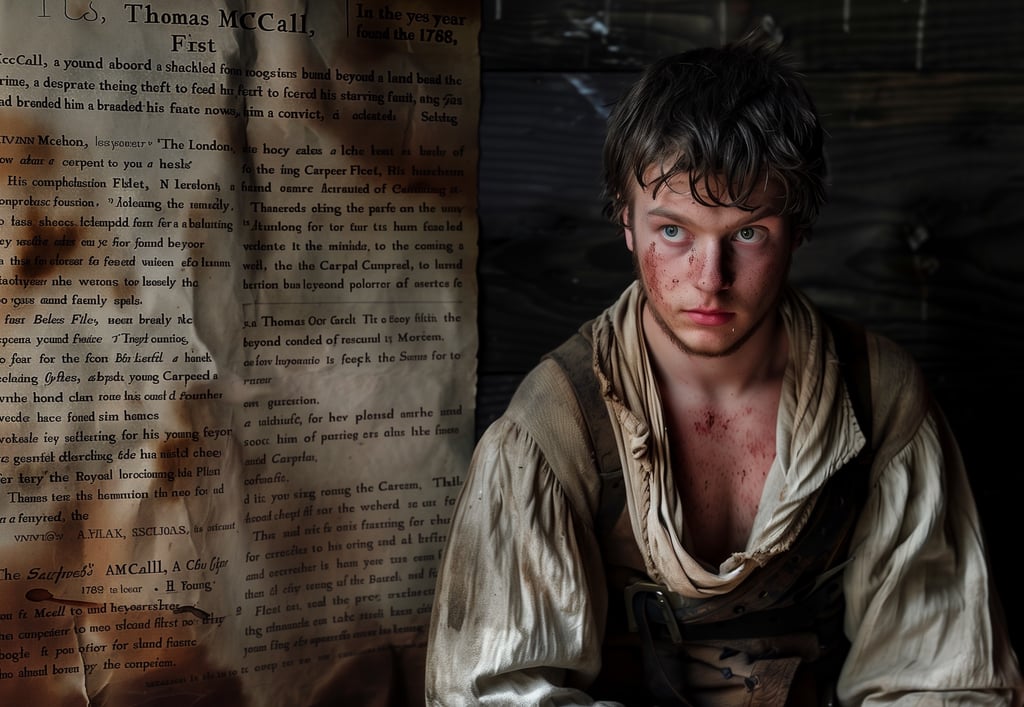Thomas McCall
From Chains to Freedom
SPIRIT OF AUSTRALIA


In the year 1788, Thomas McCall, a young and ambitious carpenter from the heart of London, faced the stark reality of his existence as he sat cramped and shackled aboard the First Fleet. The city's cruel streets had taught him the trade of woodworking, a skill passed down from his father, a legacy now tarnished by the heavy chains of condemnation. His crime, born not of malice but of desperation, a fleeting moment of theft to feed his starving family, had irrevocably altered his life's course. It was a time of dire poverty in England, where the thin line between survival and destitution forced many an honest man to make unfathomable choices.
The cold, unforgiving irons around his wrists were a constant reminder of his fall from grace, each clank echoing the societal disgrace he now bore. The crowded, disease-ridden conditions of the ship, filled with others like him – thieves, forgers, and fallen souls – were a far cry from the bustling streets of his youth, where he once dreamt of establishing his own carpentry shop. Instead, he was now bound for a land shrouded in mystery, a land spoken of in hushed tones and rumoured to be as unforgiving and brutal as the crimes that led its newest inhabitants to its shores.
For Thomas, the harsh, unknown shores of this new world were not just a punishment but a stripping away of his identity, reducing him to a number, a body to be used for hard labour in a distant, alien land. Yet, even as despair clawed at his heart, a part of Thomas clung to a sliver of hope, a stubborn belief that perhaps, in this land beyond comprehension, redemption was not entirely out of reach. This conviction, fragile as it was, became his beacon, a guiding light as the fleet cut through the treacherous waves towards an uncertain future. Little did he know that his journey, marked by hardship and transformation, would mirror the tumultuous birth of a nation, a tale woven into the very fabric of Australia's history.
New South Wales, as they dubbed this distant, untamed expanse, stood in stark contrast to the familiar cobbled streets and smog-choked skies of London that Thomas McCall had known. Here, the sun scorched the earth with a fierce, unyielding intensity, its rays unlike anything he had ever felt in the dreary, rain-soaked alleys of his homeland. The land stretched endlessly, an expansive canvas of harsh, untamed wilderness that defied the boundaries of his imagination. The stark, rugged beauty of this alien landscape was both awe-inspiring and intimidating, a constant reminder of how far removed he was from the life he once led.
Assigned to a road-building gang near the fledgling settlement of Sydney Cove, Thomas found himself thrust into backbreaking labour under the merciless Australian sun. The work was gruelling, a relentless test of body and spirit as he and his fellow convicts carved paths through the dense bushland, their efforts laying the literal groundwork for the colony’s future.
But physical strength alone was not enough to endure the challenges that this new world presented. Thomas quickly realised that survival here was a complex dance requiring not just muscular fortitude but also cunning, an ability to navigate the perilous dynamics between convicts and guards, to find leverage where none seemed to exist. It was a world where the rules of London's underbelly morphed into a different kind of streetwise intelligence, one suited to the unpredictable and often brutal realities of convict life.
Resilience, too, became a critical asset, an inner steel forged through each trial and tribulation. The searing heat, the unfamiliarity of the land, the constant threat of punishment for the slightest misstep, all served to temper his will, to transform despair into a stubborn, defiant drive to persevere. Yet, it was the flicker of hope, fragile and tenacious, that truly sustained him. This glimmer, this silent whisper of a better future, refused to be extinguished by the harshness of his surroundings or the severity of his plight.
In the depths of his being, Thomas clung to this spark, allowing it to guide him through the darkest moments, to inspire him when the weight of his chains seemed unbearable. It was this blend of cunning, resilience, and undying hope that became his compass in this strange, new world, steering him through the storm of his circumstances towards a destiny far greater than he could have ever imagined.
Life was brutal under the watchful eyes of the British guards. For Thomas, the harsh, unknown shores of this new world were not just a punishment but a stripping away of his identity, reducing him to a number, a body to be used for hard labour in a distant, alien land. Days were filled with backbreaking labour, nights with the cold embrace of the bare, earthy floor of his makeshift hut. Yet, Thomas found solace in the land’s strange beauty. The vibrant sunsets over the endless plains, the haunting calls of unknown birds, and the rustling of the eucalyptus trees spoke to him of a world beyond chains and suffering.
Amidst the relentless hardship of their daily toil, an unexpected bond blossomed amongst the convicts, a sense of camaraderie born from shared suffering and mutual understanding. Among these unlikely companions were Jack "The Whisperer" Reynolds and Mary Brennigan, individuals who, like Thomas, found themselves ripped from their past lives and thrust into the unforgiving reality of penal servitude in New South Wales.
Jack Reynolds earned his nickname "The Whisperer" not from secrecy or deceit, but from his calm and measured way of speaking, a stark contrast to the often harsh and loud environment of the convict camps. He was a man of few words, but when he spoke, his words carried weight, shaped by a sharp mind and a serene strength that drew others to him. Jack's background was as murky and complex as the dense Australian bushland, but his knack for quietly navigating the intricacies of convict life made him an invaluable ally and confidant to Thomas.
Mary Brennigan, on the other hand, brought a different kind of warmth to their small circle. An Irish nurse convicted for the 'crime' of stealing bread to feed her family, Mary's resilience shone like a beacon in the grim reality of their circumstances. Her conviction, as ludicrous as Thomas's, served as a cruel reminder of the petty injustices that led many to this distant land. Yet, her spirit remained unbroken, her care and compassion undiminished by the harshness that surrounded them. Her presence brought a semblance of comfort and normalcy to their lives, a touch of humanity in a world that often seemed devoid of it.
In the quiet moments away from the overseers' watchful eyes, under the vast, starlit sky, the trio found solace in each other's company. They shared whispered stories of the homes they left behind, the winding streets of London, the green hills of Ireland, and the simple joys that now seemed like relics of another lifetime. In the darkness, they allowed themselves to dream of freedom, to imagine a life beyond the chains and toil that defined their existence.
Their conversations, filled with longing and hope, became a nightly ritual, a momentary escape from their grim reality. They spoke of what freedom would look like – a small plot of land, a roof that didn’t leak, a day without the backbreaking labor – simple dreams that held the promise of a future worth fighting for.
In this bond, forged by hardship and sustained by shared dreams, Thomas, Jack, and Mary found the strength to endure. Their camaraderie became their refuge, a source of comfort and resilience against the cruelties they faced each day. It was in this unity that they found not just the will to survive, but the courage to hope for a life beyond the confines of their current existence, however distant that might seem.
But dreams can turn the tide. News of a convict’s pardon, a ticket of leave that granted freedom within the colony, ignited a spark within Thomas. He began to see beyond the barbed boundaries of their prison. With skills honed from years in carpentry, he offered his services beyond the assigned labour, repairing structures and building furniture for the officers. His efforts did not go unnoticed.
As the seasons cycled from the scorching heat of summer to the mild, yet unpredictable winter, time etched its passage not just on the land but on the very souls of those bound to it. The continuous arrival of new convicts, each set adrift in this foreign landscape, brought with them fresh tales woven with threads of despair and stitched with streaks of defiance. These stories, echoing the ones Thomas, Jack, and Mary had lived, served as constant reminders of the relentless, unforgiving cycle of punishment and penance that defined the penal colony.
With each new face, Thomas saw reflections of his former self, a reminder of the journey he had traversed from the depths of desolation to the glimmer of something resembling hope. His reputation as a skilled carpenter, one who could turn the rugged Australian timber into structures both necessary and beautiful, grew with each passing year. But it was not just his craftsmanship that earned him respect among both convicts and overseers; it was his integrity, a rare commodity in a place where survival often depended on deceit and betrayal.
In 1795, after enduring years of relentless toil under the harsh Australian sun and proving his worth and loyalty beyond doubt, Thomas McCall was granted a ticket of leave. This document, a significant marker of his journey, symbolised far more than the physical freedom it granted. It was a testament to his transformation, a recognition of the man he had become, distinct from the desperate convict who had landed on these shores years before. The ticket, begrudgingly issued by the British Crown, was an acknowledgment of his regained humanity, a reluctant nod to the idea that even those cast out and condemned could find redemption.
This moment, significant not just in Thomas's life but in the context of the burgeoning colony, marked a turning point. It was a signal to others like him that transformation was possible, that the chains of their past did not have to determine the shape of their future. For Thomas, the ticket of leave was both an end and a beginning, closing the chapter of his life defined by punishment and opening a new one filled with possibilities.
With this newfound freedom, Thomas faced the vast, open landscape of New South Wales not as a convict, but as a free man, albeit within the constraints that the colony's rules imposed. It was a bittersweet freedom, tempered by the knowledge of those he left behind still bound in chains. Yet, it was a step, a significant leap towards a life where he could once again lay claim to his destiny, moulding it with the same care and precision with which he shaped the wood in his workshop.
Freedom, for Thomas McCall, evolved into a notion far more nuanced than the mere absence of chains. No longer shackled and confined within the rigid bounds of incarceration, he nonetheless remained tethered to New South Wales – a land that had metamorphosed from a harsh prison into a complex sanctuary. His decision to reside near Parramatta was no mere chance; it was a deliberate choice, influenced by the burgeoning settlement's vibrant dynamics where his craftsmanship, honed through years of adversity, was not just welcomed but celebrated. The once unwelcome red earth, emblematic of his convict toil, had transformed under his hands into a symbol of creation and sustenance, nurturing the seeds of his burgeoning carpentry enterprise, a tangible testament to the perseverance and tenacity that had sustained him through his darkest times.
Mary Brennigan, his companion in misfortune turned partner in liberation, joined him in this new chapter of life. Together, they navigated the uncharted waters of freedom, intertwining their futures. Their shared journey from the depths of despair to the heights of emancipation mirrored the broader metamorphosis unfolding around them. As the penal colony gradually shed its chains to reveal the burgeoning skeleton of a community, Thomas and Mary stood as living testaments to the possibility of renewal and redemption.
The settlement that had once represented the end of the world was now burgeoning with life, evolving beyond its origins as a distant jail. Former convicts, each with their own tales of redemption akin to Thomas’s, became the unlikely architects of this new society. Together, they laid down the physical and societal foundations of what was fast becoming more than just a penal outpost but a dynamic, multifaceted community.
Thomas’s personal saga, from the suffocating streets of London to the expansive, liberating horizons of Australia, mirrored the collective narrative of countless individuals who, faced with the bleakest of circumstances, managed to forge new beginnings on the formidable shores of New South Wales. His life, interwoven with the fate of this emerging colony, became a piece of the larger mosaic of Australian identity, contributing to the rich, complex tapestry of a nation being sculpted from the adversity and aspirations of its earliest settlers.
His legacy, infused with the essence of resilience and transformation, became etched into the very soul of Australia, a country built on the backs, dreams, and indefatigable spirit of those like him – individuals who, despite being uprooted and discarded, managed against all odds to lay down new roots in a land far from the worlds they once knew. In the evolving narrative of New South Wales, Thomas McCall’s story stood as a beacon of hope and a reminder of the profound capacity for human growth and regeneration.
As the fledgling settlement of Australia unfurled into a burgeoning society, the stories of its convict forebears, interwoven with themes of despair, endurance, and eventual redemption, became the bedrock of its collective memory. The narrative of Australia's evolution is deeply marked by the lives of those first unwilling pioneers, their initial marks of shame gradually transmuted into badges of honour as their contributions to the nation's foundation became recognised and celebrated. In this complex tapestry, the figure of Thomas McCall and others like him emerged as emblematic of the resilient, unyielding human spirit that underpinned the colony's transformation.
Their tales, once whispered in the shadows of degradation and defeat, grew louder and more vibrant, echoing through the annals of time to shape a national identity forged from the fires of adversity. These stories of loss—of homelands, freedoms, and old identities—morphed into narratives of survival against the raw, untamed backdrop of an alien land. But beyond survival, they spoke of transformation, of individuals who, stripped of everything familiar, managed not only to endure but to thrive, carving out new destinies from the rugged Australian landscape.
Thomas McCall's journey from the chains of a London prison to the open, hopeful skies of New South Wales encapsulated this arc of redemption. His life, marked by the pain of separation and the harsh reality of exile, also bore witness to the incredible capacity for adaptation and growth. He, like many others, managed to turn a sentence of despair into a life of purpose and community, contributing to the fabric of a society that would one day look back on its convict origins with a complex mixture of sorrow, gratitude, and pride.
In the growing narrative of Australia, the stories of these early convicts evolved from footnotes of shame to chapters of significance, illustrating the profound truth that redemption is possible, that second chances can yield unexpected blessings. Thomas and his contemporaries stand as testaments to the belief that even in the harshest conditions, the human spirit cannot only survive but flourish, transforming bleak prospects into opportunities for new beginnings.
As the country continued to grow and redefine itself, the collective memory of its people began to view these convict ancestors not as mere criminals, but as reluctant pioneers who, faced with the bleakest of starts, laid the groundwork for a new nation. Their legacy, marked by resilience, resourcefulness, and an undying hope, became a cornerstone of the Australian spirit, a reminder that even in the darkest of times, there is always a light that can guide us toward a new dawn, a new beginning, and a new identity.
© Peter Pickering 2024. www.peterpickering.com
This story reimagines the life of a convict in early Australian colonies, exploring themes of survival, camaraderie, and the pursuit of freedom against the backdrop of a nascent society.




